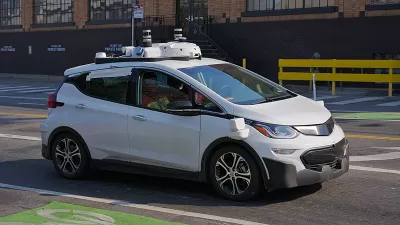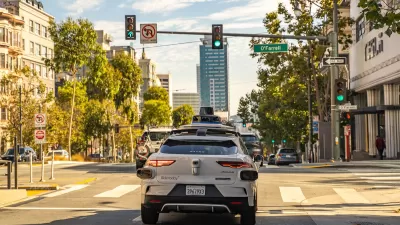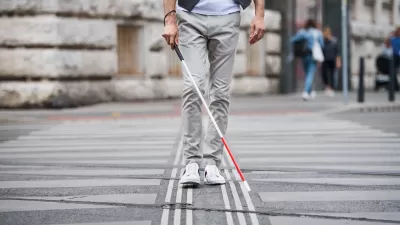Autonomous vehicle technology is no longer enjoying an uncritical reception. Skepticism, it seems, is becoming a more common response to the idea of setting robot cars free on the streets.

According to an article by Jeremy Kahn, pedestrians behavior continues to challenge researchers and engineers working on automated vehicle technology. That "burning issue" could be impacting the viability of the technology.
The message communicated by some engineers: you're crossing the street wrong. Or, as Andrew Ng puts it in the article, "Please be lawful and please be considerate."
Since an Uber self-driving car struck and killed a pedestrian in Arizona earlier this year, some safety advocates have questioned whether automated vehicles should be on the road if they can't guarantee the safety of pedestrians. Angie Schmitt's take, written shortly after Kahn's article, calls out the autonomous car industry for trying to shift blame on jaywalkers and trying to reprogram the public realm to suit the shortcomings of autonomous vehicles technology.
Kahn raises one additional interesting point, which is to say the article implies some doubt that autonomous vehicles are as viable as the technology's boosters would have the world believe. Kahn points to the struggles of Uber and Teslas as examples of the industry "losing steam." The New York Times also echoed that new doubt about the viability of self-driving technology, referencing Uber specifically in an article published yesterday.
Kahn also adds questions about other companies racing to beat everyone to the autonomous vehicle market: "Google’s Waymo has promised to launch a self-driving taxi service, starting in Phoenix, Arizona, later this year, and General Motors Co. has pledged a rival service—using a car without steering wheel or pedals—some time in 2019. But it’s unclear if either will be capable of operating outside of designated areas or without a safety driver who can take over in an emergency."
FULL STORY: To Get Ready for Robot Driving, Some Want to Reprogram Pedestrians

Planetizen Federal Action Tracker
A weekly monitor of how Trump’s orders and actions are impacting planners and planning in America.

Congressman Proposes Bill to Rename DC Metro “Trump Train”
The Make Autorail Great Again Act would withhold federal funding to the system until the Washington Metropolitan Area Transit Authority (WMATA), rebrands as the Washington Metropolitan Authority for Greater Access (WMAGA).

DARTSpace Platform Streamlines Dallas TOD Application Process
The Dallas transit agency hopes a shorter permitting timeline will boost transit-oriented development around rail stations.

Renters Now Outnumber Homeowners in Over 200 US Suburbs
High housing costs in city centers and the new-found flexibility offered by remote work are pushing more renters to suburban areas.

The Tiny, Adorable $7,000 Car Turning Japan Onto EVs
The single seat Mibot charges from a regular plug as quickly as an iPad, and is about half the price of an average EV.

Supreme Court Ruling in Pipeline Case Guts Federal Environmental Law
The decision limits the scope of a federal law that mandates extensive environmental impact reviews of energy, infrastructure, and transportation projects.
Urban Design for Planners 1: Software Tools
This six-course series explores essential urban design concepts using open source software and equips planners with the tools they need to participate fully in the urban design process.
Planning for Universal Design
Learn the tools for implementing Universal Design in planning regulations.
Municipality of Princeton
Roanoke Valley-Alleghany Regional Commission
City of Mt Shasta
City of Camden Redevelopment Agency
City of Astoria
Transportation Research & Education Center (TREC) at Portland State University
US High Speed Rail Association
City of Camden Redevelopment Agency
Municipality of Princeton (NJ)





























